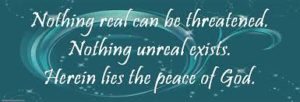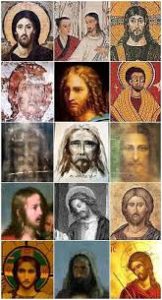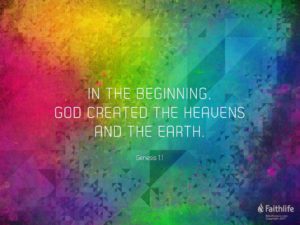
Common Mistakes Course Students Make,
Part Two:
6) Repeating Workbook titles as affirmations…
7) The Course vs Genesis: The world was created by whom?
8) My salvation (and my holiness) depends on my being a Good Course Student.
9) Jesus of the Course vs Other Jesus(s), Channeled and Biblical
10) Mixing the Course with Other Spiritual Paths
6) Repeating Workbook Titles as Affirmations…
Many Course students over the years have chanted, or repeatedly sung or affirmed the Workbook Lesson Titles as a way of ‘doing’ the lessons. In and of itself that is not particularly an unhelpful thing to do. However, if it is used as a replacement for not studying and understanding the Lesson of the day, it becomes a not-so-subtle reinforcement that we really don’t believe what the title says, and we don’t want to know or do what the lesson is really encouraging us to try.
We hope if we repeat the Lesson title enough times… we will have some kind of short-lived magical experience where we temporarily feel better. However it will not be a miracle of real understanding and application of the lesson, and thus not a genuine release from fear.
The point is we already don’t believe what any lesson title says. If we did, we wouldn’t need the Lesson, or the Workbook, or the whole Course in the first place… Repeating a Lesson title over and over is simply spinning our wheels and goes nowhere if we don’t process the entire lesson…

Take for example Les. 5 “I am never upset for the reason I think.” Consciously we are always upset for the reason we think. Otherwise we wouldn’t be upset. Jesus is always trying to get us to realize how much we don’t believe the Lesson Title, or even want to believe it. We spend a huge part of our day telling ourselves (and others) why we are upset. We have to be honest and start with what we do really believe, and then ask Jesus to help us look at our upset a different way.
Lesson #93 title says “Light and joy and peace abide in me.” Then the lesson spends the next few paragraphs telling us what we do believe. At the level of the mind, it says “you (really) think you are the home of evil, darkness and sin.” In fact when we begin to look at all lessons in general, this is what Jesus usually does. In the title he spells out how the Holy Spirit sees us and the situation. Then in the rest of the lesson he explains how we as separated selves see it, with all our judgments against each other… These judgments of ours are the blocks to our awareness of the truth in each of the lesson titles. And it is these blocks we have to acknowledge and be willing to release.
The Course’s Introduction to the Text immediately informs us at the beginning of the Course that this is not a Course about love (or affirming love), but it is about removing our own blocks (our blaming and judging) to our awareness that Love is already a done deal (Text, page 1).
When we simply affirm or chant the lesson titles, we are missing the opportunity to really look at, admit, and surrender our judgments and what we do believe as egos. In that sense when we chant or sing a title over and over again, we are trying to shout down or deny what we actually think. No matter how many times we may repeat that title, we don’t get to the core ego issues of separation and judgment, and learn to let them go.

When we fail to look at the underlying ego thought system of separation and hate and how we have identified with it and believe it… affirming lesson titles is like having a cake full of not very nice stuff, and then spreading whip cream over the top to cover the cake up. The icky cake is still there.
It is the Workbook’s job not to get us to affirm the truth, but to help us realize the not-so-subtle ways we constantly resist the truth, and then with Jesus’ help to let that resistance go. Then what’s left is our awareness of the truth (which we don’t need to affirm at that point.) We simply know it.
7) The Course vs Genesis: The world was created by whom?
It seems to take quite a while to realize, when we first begin studying the Course, that the Course says in many places the world was not created by God. It does say the world was made by the ego as an attack on God. Not only that, it also says the world doesn’t even exist. This totally contradicts what most of us grew up hearing in Genesis from the first book of the Bible, whether we believed the Bible or not. (see Genesis quote above). Choose the origin story that you prefer, but we don’t think it’s helpful to mix them both.
The Course premise, that the world was projected out from the Son of God’s erroneous belief in the tiny mad idea of separation, is succinctly explained in “3. What Is The World?” section on p.413 in the Workbook:
The world is false perception. It is born of error, and it has not left its source. It will remain no longer than the thought that gave it birth is cherished. When the thought of separation has been changed to one of true forgiveness, will the world be seen in quite another light; and one which leads to truth, where all the world must disappear and all its errors vanish. Now its source has gone, and its effects are gone as well.
The world was made as an attack on God (by the Son of God in his delusional state of separation from God)… Thus the world was meant to be a place where God could enter not, and where His Son could be apart from Him.

And from Lesson 132 “I loose the world from all (or that) I thought it was.”
The world is nothing in itself. Your mind must give it meaning. And what you behold upon it are your wishes, acted out so you can look on them and think them real. Perhaps you think you did not make the world, but came unwillingly to what was made already, hardly waiting for your thoughts to give it meaning. Yet in truth you found exactly what you looked for when you came.
But healing is the gift of those who are prepared to learn there is no world, and can accept the lesson now…
There is no world because it is a thought apart from God, and made to separate the Father and the Son, and break away a part of God Himself and thus destroy His Wholeness. Can a world which comes from this idea be real?
8) My salvation and my holiness depends on my being a Good Course Student.

Does it?
The Course insists over and over again that our peace of mind does not, repeat… does not depend on anything external. Our peace of mind is already an innate and very real part of who we truly are…
However, we are so obsessed as bodies that we are sure our well being depends on what we do or don’t do. We believe we will feel better if we do this, or perhaps more safe and secure if we don’t do that. Nothing wrong with that kind of thinking… the Course simply councils us not to take it too seriously.
To the degree that we do take it seriously, and then blame other people or situations for us not getting what we need or want, we are off running and interpreting all our dramas without allowing Jesus to remind us who we actually are… one joined invulnerable innocent Son of God, still intact in our mind. That realization would pull the rug on all our worldly franticness.
It is natural then as bodies in a frantic world to believe if we don’t do our Course lessons properly, and somehow become GOOD Course students, our salvation and happiness as such is at stake. Jesus is however trying to get us to realize that Our Innocent Sonship is already a done deal, no matter what we do or don’t.
One of the most implicit words that we could put into almost all the uplifting sentences in the Course is the word “already.”
Les. 75 “The light has come… already.”
Les. 80 “Let me recognize my problems have been solved… already.”
Les. 93 “Light and joy and peace abide in me … already.”
Les. 201-220 “I am not a body, I am free. I am still (already) as God created me.”
All of the statements above are already true. We are simply trying to pretend they are not, without ever admitting that’s what we are doing.
In the Course Jesus is trying to help us wake up to our already done-deal true Identity, through the process of forgiveness. It doesn’t matter whether we are good students or not. We are already ‘there,’ pretending we aren’t there, distracted by all our judgements (grievances) against others and ourselves. If we just let go of our judgements with Jesus help (admit them and let them go)… we would become aware of this Identity and then move through our day accordingly.
Les. 155: I will step back and let Him lead the way.
There is a way of living in the world that is not here, although it seems to be. You do not change appearance, though you smile more frequently. Your forehead is serene; your eyes are quiet.
We don’t have to be good Course students. We don’t have to do anything. We don’t have to be anything. We already are. Trying to be, or not be, a good student reinforces our belief that something’s wrong with us and needs to be corrected. It says we are not God’s One son already..
We only have to let go of insisting and proving we are not, and could not ever be, God’s Son. With Jesus or the HS help, we can let go of maintaining and investing in all our judgements on others and the attacks upon ourselves, which reinforce our made-up certainty that we are separated unhappy individual selves and not who we truly are.

9) Jesus of the Course vs Jesus(s) of the Bible & Other Channelers
There are many, many Jesus-es running around these days. When I googled “people channeling Jesus,” I got more than a million and a half results! Astounding!
How many times have we heard the phrase, when folks are talking about the latest channeled book, how… ‘it is just like the Course.’ However some immediate questions about their asserted similarity should arise:
Does the channeled information…
- talk about the mind at all? (the Course talks about the mind as the inner place where we choose either the ego or Holy Spirit, and uses the word ‘mind’ more than two thousand times.)
- does it discuss the inner guilt of choosing the ego as teacher, and then how that guilt is projected out onto the world? (The Course mentions the word guilt more than 700 times, and our need to look at it and let it go.)
- does it mention that the world is not real, and that the world was made as an attack on God? (see p.413 in WB)
- does it mention that the one and only problem we ever have is our belief in separation in the mind, and that correspondingly is where the solution is…i.e. the HS Voice in our mind? (see Les. #79-80)
- is most of it, or any of the channeled message, written in iambic pentameter (ten beats to a line)?

The answers to most (if not all) the above questions are inevitably no about 99.9 % of the time. And one can think of many other significant dissimilarities relating to the uniqueness of the Course when compared to other channeled material….
I used to belong to a church that channeled Jesus, along with many other Ascended Masters. I don’t refute that the channelers actually believed it was Jesus who was channeling through them. However after studying the Course in an even preliminary way, I can honestly verify that the message of the Course was, and is, fundamentally different than any of the channeled messages I ever heard. Those channeled messages were about behavior and how to conduct ourselves in the world, as if the problem(s) were here.
The content of the Course was and is totally different than any other traditional or new age spiritual message I’ve come across. Early on in Chapter Two, the Jesus of the Course makes clear that this is not a Course about behavior (Text, p.29), but about changing our inner guide to change the way we see things (i.e. change our inner teacher, thus change our perception).
Therefore the voices behind the different channeled (or gospel) messages, with definably different content than what are the Course’s teachings, must come from different sources other than the source of the Course, even if they are all called by the same name (in this case Jesus). Remember the 1950’s game show “To Tell The Truth”… will the real Jesus please stand up?

That brings us to the four Gospel stories that we all know. Most modern Bible scholars have no problem with discussing the fact that the Jesus stories in the gospels of Mark, Matthew, Luke, and John are mostly historically not true, though most scholars would find them theologically sound… meaning they tell spiritual truths and not historical facts.
All were written many years after Jesus and the disciples were long gone, and each gospel writer (obviously not the four names we hear so often) chose or made up different Jesus stories and different parables to get their particular message across to a particular audience they were writing to. Check out sometime how different the birth and resurrection stories are in each gospel… not to mention how many of Jesus parable stories in each gospel were totally unique to that particular gospel.
If we apply the questions listed above about channeled messages to any of the four gospel Jesuses, we will quickly see that the content of the gospel messages contain hardly any (if any) of the Course’s ideas about how we got here into the world (by believing in separation in the mind), and then how we get back to Heaven (through forgiveness…i.e. letting go of separation and judgement). None of the gospels ever mention the concept of mind (mentioned in the Course more than 2000 times), and guilt in the New Testament is real and alive and well, especially in the Sadducees and the Romans (with nothing about an internal ego belief system that we all share).
Occasionally a gospel story or two may reflect some metaphysical truths in the Course (like the Prodigal Son or the Sermon on the Mount). Overall the four different Bible Jesuses are all very separatist (and very different from each other)… only certain souls are or can be saved, but definitely not all souls. All four of the Bible Jesus are also very spiritually special. Jesus is the only real Son of God in all of the gospels; the rest of us are just God’s sinful children at best.
The only thing the gospels really have in common with the Course is that the King James version of the Gospels was written in iambic pentameter (… but none of the other versions are.)
The point is… A Course in Miracles is unique on the planet in all spiritual literature, and revolutionary in its non-traditional message of forgiveness of everyone and everything. And so the Jesus of the Course is also unique, compared to all the other Jesus(es) we have talked about above or have been exposed to throughout our lives.
So… what it comes down to… we have to choose a Jesus, our own Jesus! As it’s said in the 12 Steps, we choose a Jesus ‘of our understanding.’ Which Jesus am I drawn to and feels spiritually right for me?
10) Mixing the Course with Other Spiritual Paths

Every spiritual path whose goal is not the attainment of awareness of the non-duality of our being has to be fundamentally different in theology and practicality than the Course. Non-dual simply means that when we let go of this dream of separation, we will all be aware of our true Identity as God’s One Son in Heaven. Everything else will go back into the nothingness from which it came, including the world, bodies and all their chaotic behavior, not to mention our belief in sin and separation which was projected onto the world.
In Heaven, there is no place where God the Father ends and His Son begins.
(Ch.18, p.386, par.9…. WB Les.132, p.244, par.12)
Some eastern spiritualities profess non-duality, but their approach to enlightenment is usually to get around a Master or guru who knows true being, and let his understanding rub off on you.
The Course’ approach to eventual non-dual awareness of Self is similar to needing a master, but in this case the master is the Internal Guide the Course calls the Holy Spirit, and His process to let go of the not-self is forgiveness. First we look beyond our brother’s guilt to his real self, and then we look beyond our own guilt to our own sinlessness. Forgiveness does not take place in a worldly frame, but at the inner level of experience the Course calls the mind.
Most New Age spiritual approaches and certainly western traditional religions treat sin, insanity and the body and its behavior as real and needing fixing in this world of form. Bringing God or Jesus into the world to fix things, including our relationships, is simply not the Course.
Whenever we see another spiritual path talking about what we can do as bodies in the world to be more holy, it is off and running in a different direction than the Course. Could be diet, or exercise, or certain ways to meditate… specific healing techniques, chanting specific mantras or praying certain prayers, or ways to fix relationships between bodies. Not that anything like that is wrong or discouraged, but from the Course’s point of view they are not seen as a way to true peace. The Course’s path is simply a change of mind, a change of perception, by choosing a different inner teacher.

Worldly rituals of any kind primarily base our salvation and our peace of mind on those “behaviors”… and not on changing perception of who we are, with the Holy Spirit as guide. The Course is that simple but also that uncompromising. One can begin to see that believing mixing a body-based behavioral approach (to achieve or become more holy) with the Course’s metaphysics (that we are already holy) begins to dilute the message and process of the Course itself.
The Course says seek not to change the world (or your body or personality or individuality), but seek to change your mind about the world. (Text p.445, par.1)
Implicit in that is also… seek not to change the Course (or mix it with other spiritual paths), but seek to change your mind about the Course. The Course and its healing process of the mind are unique among the spiritual approaches of the world. It would be a disservice to Jesus, ourselves and others to undermine or dilute that process. Instead let us be grateful for this carefully laid-out, and gentle yet practical path to return to Our Loving Father.

And so, do you agree… what’s your top ten?

(Part One)
To refer back to Ten Common Mistakes, Part One, click here

For further discussion by Ken Wapnick,
about keeping the Course on-course,
see the DVD or MP3 download
“Seek Not to Change The Course”
… click here
